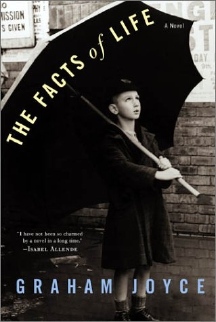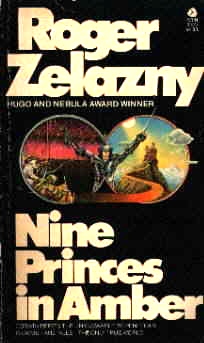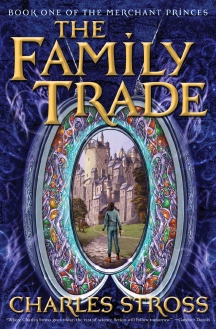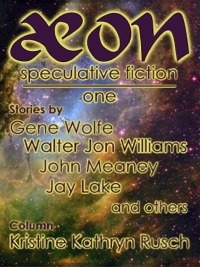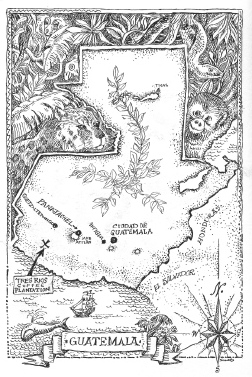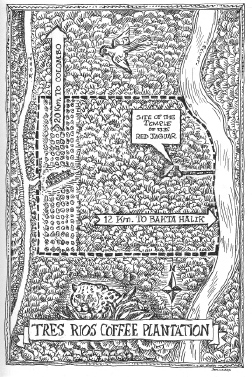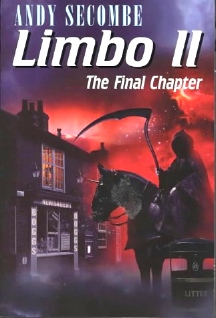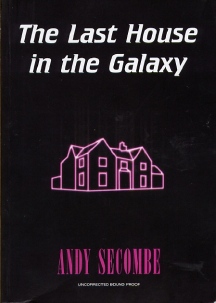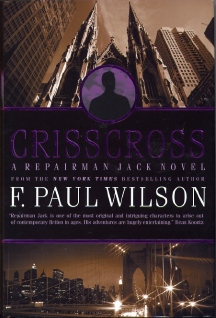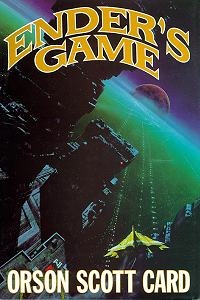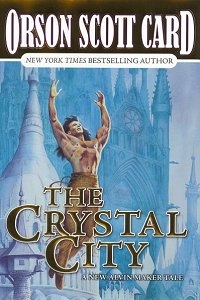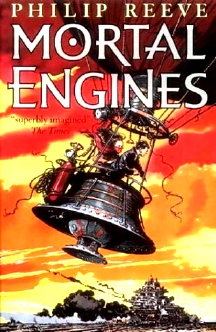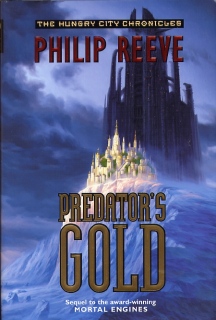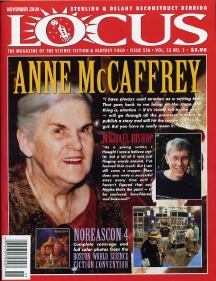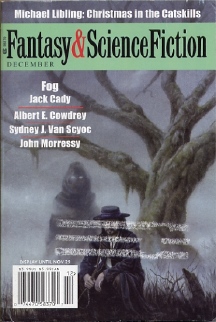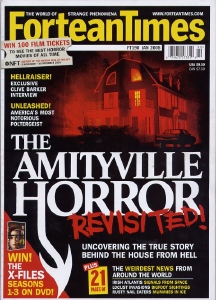|
|
|
This Just In...News from the Agony Column
|
11-12-04: Unlimited Enchantment |
|||||||||
A
Conversation With Graham Joyce
When I first showed up at KQED -- I think it was only a year and half ago -- they were still using huge reel-to-reel tape decks and cutting tape with razor blades. It seemed so quaint! Now, each booth is equipped with a ready to reboot workstation, and a Windows-based application that when Graham and I were recording managed to hang in the midst of the session.
Graham's one of those great interviews whom you can simply hand a single line, and he'll spin it into a fascinating tale. His new novel, 'The Limits of Enchantment', which the publisher intends to submit for a Booker Prize, is due out in late January in the UK from Victor Gollancz and in late February from US publisher Atria Books. Of course, it's very early days yet. But in terms of quality, this book is clearly in the right place. Simon Spanton, the mastermind behind Victor Gollancz's incredible line of novels was kind enough to send me one of the earliest galleys, and my readers can read an exclusive advance review of this forthcoming novel now.
I've created both MP3 and RealAudio files for the readers to download. Like many of the writers you'll find featured here, Joyce's work is hard to categorize. Sometimes he ends up in amidst the horror fiction, and sometimes he ends up with the literary fiction. So when you go to your independent, locally owned bookstore, be patient, ask for help, and if they don’t stock his work, order it up. This is precisely the type of book that will sell quite well for the independents. He'll appeal to the independent reader. Of course, you can depend upon my independent judgment. |
|
11-11-04: Charles Stross Follows 'The Family Trade'; Aeon Speculative Fiction Quarterly One |
||||||
A
Princely Tradition of Merchants and Amber
The premise to these novels was fairly simple; certain people have the ability to walk between iterations of our world. The first novel begins when Corwin regains consciousness in a hospital room, and as he begins to learn of his world, so do we. Our world, it seems is but a Shadow of the true world. Joined by his sister Flora and his brother Random, Corwin has to re-learn how to walk between the worlds and prevent his brother Eric from killing him and conquering the true world, Amber. Zelazny combines narrative drive with hallucinatory passages that create the reading equivalent of the drug experience without any of the nasty aftereffects. The first five Amber novels -- 'Nine Princes in Amber', 'The Guns of Avalon', 'Sign of the Unicorn', 'The Hand of Oberon' and 'The Courts of Chaos' offer a complete story full of pulpy fun, fast-paced action and a wonderfully revealed vision of parallel worlds. Zelazny applied a largely contemporary voice and attitude to the subjects of high fantasy and the result was a winning series. Of course all good things must come to an end, and as often as not in the world of series fiction, the Amber books did not come to an end soon enough. Zelazny followed up the first five books with five more that offered more action but little progress. The visionary drive that informed the first series began to seem tired in the second series, and once the secrets of 'The Courts of Chaos' were revealed, they couldn't be re-revealed. Still the combination of contemporary Americans cast into a parallel world of fantasy, where actions in this world have reverberations in the next -- and vice-versa -- was compelling and ripe for further exploration.
The setup for 'The Family Trade' is not dissimilar from the Amber novels. Miriam Beckstein is a successful reporter who stumbles onto a money-laundering scheme that she thinks is hot headline material. But when she brings it in, she's fired by her editor (editors are EVIL!) shortly before the death threats start. It's going to be a tough day for Miriam. Miriam's entrée into the world of the fantastic is a locket that once belonged to her mother, who was murdered when she was an infant. Opening the locket, she gazes into the pattern within and transports herself to a parallel Earth where knights on horseback hunt their prey with automatic weapons. In this world, Miriam's mother was a Clan leader -- and now Miriam is a threat to those who killed her mother. But Miriam -- being a Stross female character -- has the wherewithal to be pretty damn threatening herself. And her enemies aren't going to find her easy prey. 'The Family Trade' is clearly the Stross take on fantasy. At 304 pages for the entire first novel in the series it looks to be a concise take on fantasy, and since it's the work of Charles Stross, we can expect some lively language and intelligent speculation. That's the big question. Stross is a whiz kid when it comes to SF, and that is in part the result of his willingness to pack in dense slabs of cutting-edge science and then riff on them till after the sun sets. Fantasy doesn't feed off of cutting edge science. Fantasy feeds off of visionary imagination, which Stross has demonstrated he has in his science fiction novels. In theory, then, we should be good on the imagination count. Stross also likes to pack a good mystery plot into his SF, and if he plugs one into 'The Family Trade' the chances are that he'll achieve the same sort of breakthrough feel in fantasy that he has in science fiction. Heck, at the very least expect, 1) the unexpected and 2) more than a few laughs. Give me that in 304 pages and I'll be happy. But 'The Family Trade' calls itself 'Book One of the Merchant Princes', wearing its Zelazny influence on its sleeve. I'm all for that. And as with Amber, lather, rinse, repeat will work a couple of times. In his informative well-worth visiting website, Stross tells us that at least two more are sold, and he hopes to sell more down the line. If Stross is writing a series modeled after a detective series, in which a hero(ine) we (come to) love has adventure after adventure in time and space, then, perhaps a long series will be welcome. But if we're presented at the onset with a problem to be solved, and that solution keeps getting postponed so the becoming-less-likable-every-sequel hero(ine) can bop about through time and space, putting off the solution, then count on our patience and interest to dwindle at an accelerating rate. The question is not how welcome is a new fantasy from Charles Stross. It's totally welcome. The question is whether or not he can keep up his torrid pace -- he's released three books this year alone -- and not wear out his welcome. Science fiction and fantasy thrives when writers like Stross break down the barriers. Of course when you're out there thrashing about, it's easy to break the too-many-sequels barrier. Breaking the barriers is good. Breaking just the right barriers is what distinguishes the good from the great. |
||||||
Electronic
Fiction for Electronic Readers
Some pretty sweet magazines have had their brief life in the aether of the Internet. I was fond of 'The Spook', a very bold experiment that featured the fiction of Joyce Carol Oates, Poppy Z. Brite, the column from which Ramsey Campbell's PS Publishing collection of non-fiction takes its title. For all the heat behind this remarkable electronic magazine, it still eventually tanked. But that hasn’t stopped the drive to make what in theory should be a great way to get great fiction out in a nice format. Witness the latest magazine to take a stab at an electronic format, Aeon. It must be said that Aeon is off to a mind-boggling start. With the first issue, you get short stories by Stephen Boyett (a reprint), Gordon Gross (actually the writing team of Eve Gordon and Harold Gross), Jay Lake, and Gene Wolfe, a short novel by Walter Jon Williams, 'Logs', that's an excerpt from the forthcoming capstone to his 'Dread Empire's Fall' trilogy, a column by Kristine Kathryn Rusch, and a novelette by British superstar author John Meaney. That's a stellar lineup by any evaluation. Editors Marti McKenna and Bridget McKenna have brought together a top-rate collection of writers for this electronic launch. All the details are, of course, available on their website. I'd suggest a daily check to track what they're doing, since worthwhile new items seem to be flying in at a rapid rate. Format is the key, one would presume. Aeon, we are told is available in several downloadable electronic formats -- MSReader, MobiPocket, Adobe PDF "and others". The real question is whether or not readers are willing to pay for an intangible asset. Of course, that's why electronic fiction can afford to offer such high-profile authors. There's no publishing costs beyond the "Save as..." But readers -- hell any consumers of any service -- like to have something to hold after shelling out their money. They're willing to go as low as CD's and DVD's, which really skim the bottom as far as material rewards are concerned. Now here's the rub. The kind of readers who will be truly excited by this line up -- and I'm among them -- are also the kind of readers who trend towards being excited by the physical book, or magazine. But all it's going to take is for one venture such as this to succeed. Once one electronic magazine gets its foot in readers' doors, the barrier will be broken and the trend will be set. And once this trend is set, the world of fiction writing will really see a huge upswing. Writing will once again at least have the potential to be profitable, and publishers will be able to flourish. Part of the problem here is that, surprisingly, we don't have the technology. Electronic paper is still a ways away, and none of the various e-book formats have really caught on. But there's hope out there. Palmtops and laptops are starting to get more portable, and hell -- portable DVD players might just be the true salvation of the e-publishing industry. In the interim, what we most certainly and verifiably do have with Aeon is a fantastic collection of great fiction. Which, of course, you'll want to read. The editors are hoping that you’re not going to want to wait for the eventual hardcopy 'Best Of' anthology. And this first issue is a pretty persuasive argument not to wait. So to your list of expensive books, you can add one more expense -- an expensive book reader, into which you can download your competitively-priced electronic books. It's always just more books with your Rick, isn't it? No, not this time -- it's more downloads! But how will we stack them on the dining room table? |
|
11-10-04: Kent Harrington's 'Red Jungle' From Dennis McMillan; From 'Limbo' to 'The Last House in the Galaxy': Repairman Jack Redux |
|||||||
| Be
Still My Death Squad-Riddled Heart By Terry D'Auray
But some future releases, very few, generate an embarrassing salivating response where anticipation morphs into near trembling fervor. I call them "be still my heart" books, and I stumbled across one as I was reading the November issue of 'Firsts" Magazine. Right there on page 63, in the ad for Dennis McMillan Publications, is the announcement of a first edition printing of 'Red Jungle' by Kent Harrington. McMillan's website (which I check far more often that he updates it) makes no reference to this book, coming in late November. But having been on the "loved-it" side of Harrington's 'Dia de los Muertos' earlier this year, I simply can't wait to get my hands on his new one. Here's what McMillan has to say about it: "Better even than his 'Dia de los Muertos', 'Red Jungle' is, indeed, a masterpiece, in the tradition of Graham Greene's 'The Power and the Glory' and B. Traven's 'Treasure of the Sierra Madre'. It's that good. Set in modern Guatemala, Kent tells the story of Russell Cruz-Price, a lost soul who's come back to the land of his birth, on a journey to discover his own history, and also to search for the Red Jaguar – a legendary Mayan temple deity whose size alone puts it in the "priceless" category of antiquities. When he starts these quests, he has no inkling that his heart and soul will be captured by one of the ultimate sirens of modern fiction, and with her as his polestar, he navigates a course through both the strange, family-based web of landed gentry, which, because of his dead mother's position, he finds himself bizarrely welcomed into, and the brutal, death-squad-riddled social and political fabric of the still-feudal "modern" Guatemalan state, in an attempt to come to terms with what his mother's blood has bequeathed him, both intellectually and in his heart-and-gut-feelings for the country of his birth. It's a hell of a trip and beautifully written."
McMillan clearly has a passion for this work – and he's a thoroughly reliable judge of noirish works of exceptional quality. Equally clear, McMillan has a strong aversion to the use of the period in his sentences. |
|||||||
Andy
Secombe's Got A Million of 'Em
So I've got more than my share of empathy for the raging Golgons of Andy Secombe's latest novel, 'The Last House in the Galaxy'. Peeved at their status, the Golgons, led by the pitiless Gulgus Filch, have decided to lay waste to those whose waste they once collected. Who can stop them? The United Planets Federation, that's who. If only they can find a nice place to meet. That might turn out to be Hambledon Hall, if it can be rescued from the City whiz-kid who wants to turn it into a weekend conference center. It happens that there's even a convenient wormhole beside a Rhododenron bush just beyond the ha-ha. Sir Mortimer and Lady Trenchard appear to have had their prayers answered. Of course, this being a silly British science fiction farce, everything and everyone is bound to encounter more problems than pluses.
So now, having staked a claim in the same turf that Pratchett owns, lock, stock and two smoking barrels, Secombe is out to mine the genre made famous by fellow Brit Douglas Adams. Don't know about you, but I was a fan of Adams from the first time I read HHGTTG, and particularly, since I saw the Doctor Who episode 'The Pirate Planet'. But it's clear to me that British Farce SF is a genre wide open and tapped at this time only by Rob Grant, who in addition to the 'Red Dwarf' TV show and books has authored 'Incompetence', about a future EU that's made incompetence a protected skill. If only! While 'The Last House in the Galaxy' is not the last word in science fiction, it is quite certainly the first bit of silliness we've seen since well...the last time we saw some silliness. I can't actually say when that was; after all, I don't write these things down. I write them up. |
|||||||
'Crisscross' I Was Taking a Loss
I'll say. This time around Repairman Jack takes on two clients. The first is a nun being blackmailed by someone who has photos she doesn’t want made public. You can only guess what they might be. Chances are you'll find out, though, eh? But at the same time, Jack's been asked by an elderly woman to find her missing son. Seems easy enough. But he's been swallowed up by the Dormentalist Church, a secretive, globe-spanning collection of kooks with big names, big smiles and Big Lawyers. Oh Boy. Repairman Jack versus the oh-so-thinly disguised $cientologists. Now, I've been fascinated by the $cientologists for a long damn time. My friend the Book Finder -- the kind of guy who buys a box of books from a garage sale and turns up a Mark Twain first edition -- long ago bequeathed me 'L. Ron Hubbard: Madman or Messiah', written by one of the sons of Hubbard. That should give you some idea as to my thoughts on $cientology. Or Dormentalism. It seems to me that (whatever you want to call it) they've got one of the most peculiar slants on the ol' Invisible Friend shtick out there, yet, somehow, they manage to suck in people you'd think would be able to tie their own shoes without tying them together. But no. Smiling, deadly serious, ready to litigate with an army of lawyers that's earned a rep similar to any Black-Ops combat squad, the $cientologists soldier on. If you see this page go up, then get suddenly changed without explanation, well...you know the reason. But I'm not talking about the $cientologists, I'm talking about my man Repairman Jack, one hell of a dependable supernatural sleuth. You think that the Otherness might have aught to do with the Dormentalists? I'm not just guessing -- I'm hoping that's the case. And it appears that after a nice bit of light banter in Florida, Repairman Jack is going to be back on the dark side of the equation. With every novel, he's getting closer to having to shed his identity-less identity. I mean, he's going to be a father soon, though Your Favorite Invisible Friend knows that with each novel in the Repairman Jack series, the time gets shorter. I don't know how many more Repairman Jack novels we can have before he's going to be forced to confront the results of it all in 'Nightworld'. Pretty soon we'll have novels that take place in less than a day. You can check out the timeline over at Wilson's entertaining web page, at www.repairmanjack.com. So savor every Repairman Jack novel. Savor every day that Seven Savage Lawyers From Beverly Hills do not decide to pick your bones clean. And if you have a second, spare a thought for me, should you see this web page be "updated". I didn’t really mean to say anything at all about $cientology. I mean, obviously, I can't even $pell it. |
|||||||
|
11-09-04: Orson Scott Card’s ‘The Crystal City’; Philip Reeve Mines for 'Predator's Gold' |
||||||
| Tell
us a Story, Uncle Orson by Stephanie Cage
I’m pleased to have happened across this site. I can’t think of anyone better than Uncle Orson to provide writing advice. Veteran tutor of half a dozen of the US’s top creative writing courses and author of two ‘How to Write’ books, Card burst into the limelight in the eighties with the ‘Ender’s Game’ series. The honour of being the first ever author to win both the Hugo and Nebula awards two years in a row was thoroughly deserved. Both ‘Ender’s Game’ and its sequel ‘Speaker for the Dead’ achieve the unusual feat of being both chilling and uplifting, combining terrifying brutality with a deep-rooted faith in the human race. Not surprisingly, given the popularity of ‘Ender’s Game’, rumours of a film have been circulating for years. A major obstacle has always been the large amount of violence in the story, especially as the story is set in a battle school for kids with army potential, and Card has held out for a faithful production, complete with fights by genuine school-age children. With a strange variety of aliens known as ‘Buggers’ as the official enemy, and a gang of kids led by a particularly brutal bully as the unofficial one, the story isn’t designed to appeal to film censors. Nevertheless, after many near misses, a film version is finally on the cards (if you’ll pardon the pun) for 2006. Definitely one to watch for. Although the first two Ender books are still, arguably, Card’s greatest success, he has continued to please both fans and critics. After what was thought by most to be the final part of the Ender trilogy, ‘Xenocide’, came an unexpected fourth volume, ‘Children of the Mind’. That in turn was followed by a parallel series featuring Ender’s brother Peter, an equally extraordinary character first introduced way back in ‘Ender’s Game’. Card looks set to capitalise on the success of the series for some time yet. As well as this series, Card is well known for two others: ‘The Call of Earth’ and ‘Alvin Maker’. The latter in particular has also met with its fair share of acclaim. Sometimes described as a rival to Stephen Donaldson’s Thomas Covenant series, it is set in an alternative version of the American frontier. In this world, magic works and seventh sons of seventh sons, like Alvin, have extraordinary powers. Volume 5 in the series (‘Heartfire’) received France’s highest science fiction award, The Grand Prix de l’Imaginaire, in 2000.
'The Crystal City' pits Alvin’s magical talents against an unusual enemy: the plague that is ravishing Nueva Barcelona. In a perennial theme of Card’s novels (and one which he discusses in detail in his fascinating book ‘How to Write Science Fiction and Fantasy’), the protagonists’ magical abilities create more problems than they cure. Alvin’s wife Peggy foresees a terrible war, and Alvin must struggle to prevent it, but his efforts to protect his friends drag him and them into yet more danger. Card is expert at piling up the terrors and traumas, then leading his characters out of apparently impossible dilemmas in just-about believable ways. He may have a literary turn of phrase now and then, and sneak in some intriguing social commentary, but he never forgets that a storyteller’s first responsibility is to entertain his audience. I’m looking forward to being entertained by ‘The Crystal City’. |
||||||
Cities
in Fight
Presented as the first in 'The Hungry City Chronicles', 'Mortal Engines' won a Nestle Smarties Book Prize Gold Medal and was short listed for the Whitbread Children's Book Award. Of course, the appeal of such books is not limited to the young. By not writing down to his audience, Reeves creates novels that are worth reading by anyone who find the idea of honking cities on tracks pursuing one another particularly attractive. That includes a lot more than just the young. The appeal of books like this to adults -- and to me is two-fold. First off, you've got a book that's not bloated. This is a slimmed down, fast and easy to read novel. He's followed this up with 'Predator's Gold' (HarperCollins / Eos; September 14, 2004; $16.99). Tom and Hester, who met in 'Mortal Engines', have been traveling on the Jenny Haniver, an airship that's taken them from the remains of England to Africa, and now back north again. (My Fortean readers will get a kick out of the airship's name, which is the name that P. T. Barnum gave his famous hoax of a "Genuine Mermaid".)
"North America," said Pennyroyal, "is a Dead Continent. Everyone knows that. Discovered in the year 1924 by Christopher Colombo, the great explorer and detective, it became the homeland of an empire that once ruled the world, but that was utterly destroyed by the Sixty Second War. It is a land of haunted red deserts, poison swamps, atomic-bomb craters, rust and lifeless rock." Of course any book that starts out with a monologue like this is of instant interest. Reeve's work has drawn favorable comparisons to Jack Vance and Philip Pullman. But comparisons be damned. Any novel that includes an entry on "Christopher Colombo, the great explorer and detective" is a novel I want to read, both as fan of the utterly absurd and as a fan of the rumpled detective. Reeve is clearly on to something pretty unusual here. With a third installment due out in the UK mid-next year, 'Predator's Gold' looks like a nice quick read, as long as the Sixty Second War doesn't break out. Here in the Dead Continent of America, we're starving for new novels. |
|
11-08-04: Locus 53, Fantasy & Science Fiction December 2004, Fortean Times 190 |
|||||||||
November,
December and January Arrive in a Single Week
Let's look at them in chronological order, just for grins. Are you grinning yet? The 2004 Issue of Locus, Issue 526, offers the delights of an interview with genre-giant Anne McCaffery and another genre giant, Michael Bishop. I've been reading both since the before-time. I remember carefully collecting and shelving McCaffery's first three Dragon novels when I was but a lad, and reading Bishop's work since 1984, when the irresistible combination of Arkham House and JK Potter put the wonderfully surreal 'Who Made Stevie Crye?' at the top of my then-greatest hits list. He's since returned to note with his Golden Gryphon collections, 'Blue Kansas Sky' and 'Brighten to Incandescence'. McCaffery is simply one of the giants whose sales keep an entire genre afloat. Going all out for Worldcon, Locus offers page after page of color photos from Noreascon 4, Brought To You By Thomas Covenant, Terry Pratchett, Tad Williams and (appropriately) Worldcon 2005. Everybody you wanted to see is there, without ever having to leave the comfort of your home. We SF readers, after all, are not exceedingly fond of leaving our homes, are we? Of particular note in this issue are the thoughts of both Samuel R. Delaney and Bruce Sterling on the passing of Jacques Derrida, the French philosopher whose theory of deconstruction influenced them both. Delaney concludes that for Derrida, "...evasiveness was necessary, however, because he wanted to hold open as an active reality, the possibility of any new reading -- of any text, no matter how new or traditional that text was..." Sterling suggests that "Language is a vast tumbling mess...Now he belongs to the ages. Let the ages sort him out." Both writers are worth reading in full; that's why you subscribe to the magazine.
Then there's the fiction. The issue begins with the last story by noted horror writer Jack Cady, who sadly passed away in March. Matthew Jarpe and Jonathan Andrew Sheen contribute this issue's novella, 'The Bad Hamburger'. With a title like that, it's already got my attention, and by the time you get to page 2 of the story you realize that it's about a cop working on Data Crimes. I'm highly intrigued. Michael Libling's 'Christmas in the Catskills' got a nice call out in Locus (which must have got the issue before me, eh?). Sydney J. Van Sycoc took ten years off to make bracelets and jewelry here in the Northern California, but she's back in the fiction game again with 'Angel Wings'. Albert Cowdry returns to Azalea Place, the scene of his former literary endeavors for F&SF with 'The Name of the Sphinx'. And John Morressy offers the election-themed 'Walter and the Wonderful Watch'. Strictly coincidence, no conspiracy here!
Rick Moran is the lucky chap assigned to nail down the tale of the Amityville Lutz family, once and for all. And I must admit that FT is right; with all the crap movies and crap books we've seen on the story, we've never really seen a concise going-over of the supposed facts. Elsewhere in the issue we get a great bit on a piece of performance art -- six glass bottles found floating in a lake, each with a two-sided photo of a hand attached to the cork, each containing Ouija-board gibberish appropriate to the site where the Blair Witch Project was filmed back in the days before everyone had electric power. Remember those days, just before the millennium? I hope you were subscribing to FT then as well. Maybe their next issue will be back-dated to those halcyon times. |


